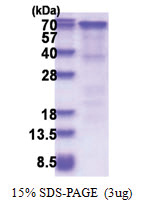TCF4 (1-507, His-tag) Human Protein
Other products for "TCF4"
Specifications
| Product Data | |
| Species | Human |
| Expression Host | E. coli |
| Expression cDNA Clone or AA Sequence |
MGSSHHHHHH SSGLVPRGSH MGSMKFKQCR CSDTGLCCLD HEGKAEVYAP SASTADYNRD SPGYPSSKPA TSTFPSSFFM QDGHHSSDPW SSSSGMNQPG YAGMLGNSSH IPQSSSYCSL HPHERLSYPS HSSADINSSL PPMSTFHRSG TNHYSTSSCT PPANGTDSIM ANRGSGAAGS SQTGDALGKA LASIYSPDHT NNSFSSNPST PVGSPPSLSA GTAVWSRNGG QASSSPNYEG PLHSLQSRIE DRLERLDDAI HVLRNHAVGP STAMPGGHGD MHGIIGPSHN GAMGGLGSGY GTGLLSANRH SLMVGTHRED GVALRGSHSL LPNQVPVPQL PVQSATSPDL NPPQDPYRGM PPGLQGQSVS SGSSEIKSDD EGDENLQDTK SSEDKKLDDD KKDIKSITSN NDDEDLTPEQ KAEREKERRM ANNARERLRV RDINEAFKEL GRMVQLHLKS DKPQTKLLIL HQAVAVILSL EQQVRERNLN PKAACLKRRE EEKVSSEPPP LSLAGPHPGM GDASNHMGQM
|
| Tag | His-tag |
| Predicted MW | 56.6 kDa |
| Concentration | lot specific |
| Purity | >90% by SDS - PAGE |
| Buffer | Presentation State: Purified State: Liquid purified protein Buffer System: 20 mM Tris-HCl buffer (pH8.0) containing 10% glycerol 0.1M NaCl |
| Preparation | Liquid purified protein |
| Protein Description | Recombinant human TCF4 protein, fused to His-tag at N-terminus, was expressed in E.coli and purified by using conventional chromatography. |
| Storage | Store undiluted at 2-8°C for one week or (in aliquots) at -20°C to -80°C for longer. Avoid repeated freezing and thawing. |
| Stability | Shelf life: one year from despatch. |
| Reference Data | |
| RefSeq | NP_001077431 |
| Locus ID | 6925 |
| UniProt ID | P15884, B3KVA4 |
| Cytogenetics | 18q21.2 |
| Synonyms | bHLHb19; E2-2; FECD3; ITF-2; ITF2; PTHS; SEF-2; SEF2; SEF2-1; SEF2-1A; SEF2-1B; SEF2-1D; TCF-4 |
| Summary | 'This gene encodes transcription factor 4, a basic helix-loop-helix transcription factor. The encoded protein recognizes an Ephrussi-box ('E-box') binding site ('CANNTG') - a motif first identified in immunoglobulin enhancers. This gene is broadly expressed, and may play an important role in nervous system development. Defects in this gene are a cause of Pitt-Hopkins syndrome. In addition, an intronic CTG repeat normally numbering 10-37 repeat units can expand to >50 repeat units and cause Fuchs endothelial corneal dystrophy. Multiple alternatively spliced transcript variants that encode different proteins have been described. [provided by RefSeq, Jul 2016]' |
| Protein Families | Druggable Genome, ES Cell Differentiation/IPS, Transcription Factors |
Documents
| FAQs |
Resources
Recombinant Protein Resources |
{0} Product Review(s)
0 Product Review(s)
Submit review
Be the first one to submit a review
Product Citations
*Delivery time may vary from web posted schedule. Occasional delays may occur due to unforeseen
complexities in the preparation of your product. International customers may expect an additional 1-2 weeks
in shipping.






























































































































































































































































 Germany
Germany
 Japan
Japan
 United Kingdom
United Kingdom
 China
China
